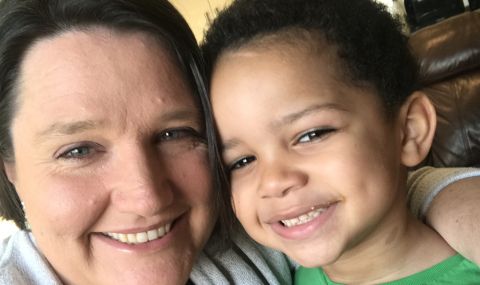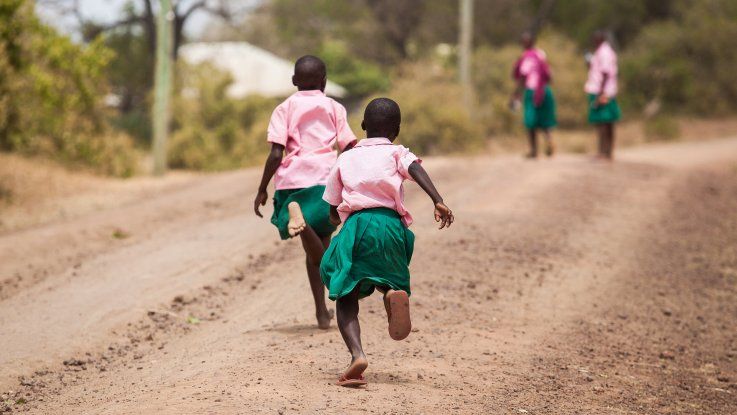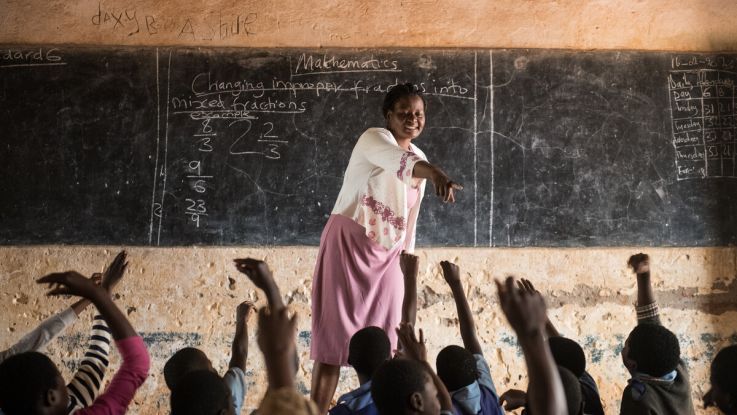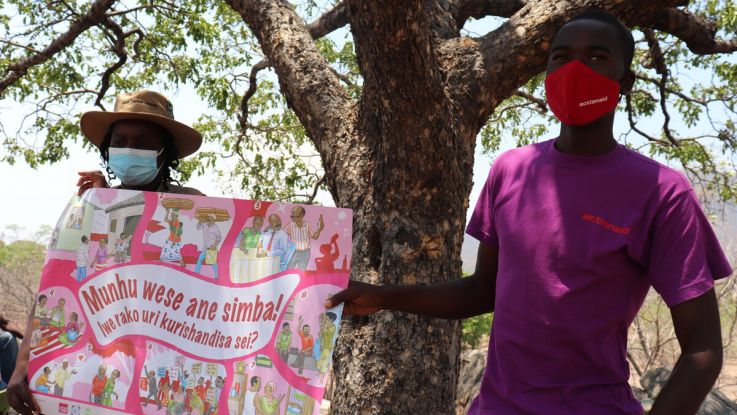My story: A feminist and mum under lockdown
20 May 2020
ActionAid’s Lee Webster discusses how she juggles her work on women's rights and being a mum during the coronavirus lockdown.

Apart from working for ActionAid, I also run home school for my four-year-old son, Zac, during the lockdown. Photo: Lee Webster/ActionAid UK
Ever since I can remember, I’ve been passionate about women’s rights. It’s what gets me up in the morning.
I’m really and truly lucky that for most of my career, protecting and promoting women’s rights has been at the heart of my work. I get to work with such talented and determined people every day, who go the extra mile to make life better for women and girls.
And global pandemic or not, that work doesn’t stop.
So, we’re all at home, what’s different?
Well for me, the coronavirus pandemic has brought all the aspects of my life into one place – the living room of my south London flat. I’m mum to Zac, who’s four, so I’m juggling running a big and busy team, with running home school! I can confirm that running a big and busy team is much easier!
Like most feminists, my women’s rights work doesn’t end when the work day does, so I also try to do a bit of volunteering in my community, working with other women to get information about local support services to marginalised families.
I always feel I don’t have time to do as much as I’d like, but if we all do a little bit, it will make a difference.
ActionAid is a flexible employer, so I work hours to meet the needs of my family caring responsibilities. I tend to log in at 8am, check in on the wellbeing and health of my teammates, deal with urgent emails, then log out at 9am and put my teacher hat on!
Putting my teacher hat on – working with my four-year-old son, Zac
My attempts at teaching phonics (I learnt my ABCs the old fashioned way, so have had to relearn!), simple maths and wacky science experiments are met with mixed levels of approval from Zac.
And yes, the technology battle is real – not a day goes by without a little tussle of wills over how much screen time is acceptable. And don’t get me started about how many times a week a four-year-old thinks it is OK to eat chicken nuggets and microwave chips.

Apart from working for ActionAid, I also run home school for my son, Zac, during the lockdown.
At lunch time I log back in and start meetings and work and Zac’s dad takes over the afternoon duties – but we don’t have a huge place, so sometimes Zac joins my meetings. His particular favourite thing to do is write POOP in the chat box of whichever meeting I’m in. Always grateful for my colleagues’ senses of humour and acceptance!
In turn I’ve met their dogs, cats and fish, admired their wine racks and book collections, got to know people in a new way. It’s not all bad!
What do I work on at ActionAid?
My work is really varied – but always focused on women’s rights. Sometimes we’re working on building large programmes that tackle violence against women and girls, or supporting adolescent girls to claim their rights at school, or developing tools with young urban women to mobilise and hold their own governments to account for the decisions that impact their lives.
One afternoon I’ll be on a call with colleagues in Kenya to hear programme updates, another time I’ll be doing a media interview on the rise of domestic violence in lockdown. All from my living room of course.
Coronavirus pandemic and its impact on women and girls
The thing that I focus on, above all, is that the COVID-19 pandemic affects women in many disproportionate ways.
As well as facing the virus, women across the world are facing heightened risks of domestic violence, vastly increased levels of unpaid caring roles, for children, elderly and sick relatives, and loss of jobs and livelihoods.
Furthermore, around the world we’re seeing that women’s voices and expertise is not being fully included in decision-making or planning to rebuild economies and lives.
Not only is it women’s right to be represented in decision-making, we also know that recovery and rebuilding will be stronger and more effective when women’s voices are heard.

ActionAid's female frontline worker preparing food packages for distribution in Gaza during the COVID-19 pandemic.
I feel that my role with ActionAid can play a small part in making sure the demands of feminist organisations, women leaders and community members across the global south can be heard, and can influence and inform governments in the global north as well as our own work as an international development organisation.
What I’ve learned during the lockdown
I’ve listened, learned, and tried many things in the past few weeks to get through lockdown. I’m hearing that different things work for different people, and you need to try a few things out.
For me, plants and greenery help a lot – I’m turning my little balcony garden into a forest of plants, learning as I go. The green is now coming inside, and I got my hands on a couple of new house plants from a neighbour (socially distanced of course).
Through trial, error and internet searches, I am learning to keep them alive and hopefully thriving. I was delighted last week when my friend’s mum in Nairobi identified a plant on Twitter for me – intercontinental plant buddies are my new favourite thing.
I also love a jigsaw, and some front room dancing (now really is the time to dance like no-one’s watching!).
If I have one tip, it’s to go easy on yourself.
Don’t try to be a super woman, super mum, super worker: just be you. Your wellbeing is prime, and the best gift you can give yourself is to make time for it."
I know it’s not easy. I definitely don’t always get the balance right, but I try to celebrate the small victories, and go easy on the things I didn’t finish today.
I hope lockdown is safe for you, that home is a sanctuary. If it isn’t, you’re not alone. There are ways to reach out and get help. The National Domestic Abuse Helpline on 0800 247 2000 is an excellent first point of call.
How you can help
ActionAid is on the frontline of the coronavirus crisis helping to stop the spread and save lives as the pandemic hits the world’s poorest countries.
From Italy to India, Liberia to Kenya, local ActionAid-supported women’s groups are distributing life-saving advice, health information and hygiene kits to vulnerable communities.
We are also distributing food packages and essential supplies, working to stop violence before it happens, and provide support to women and girls who are affected. Please donate now to help us reach people in urgent need.



